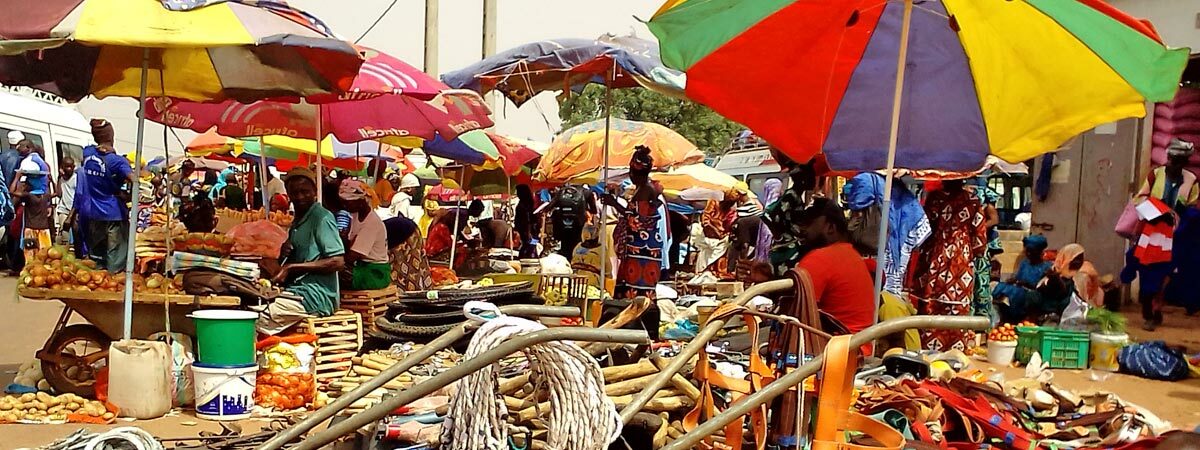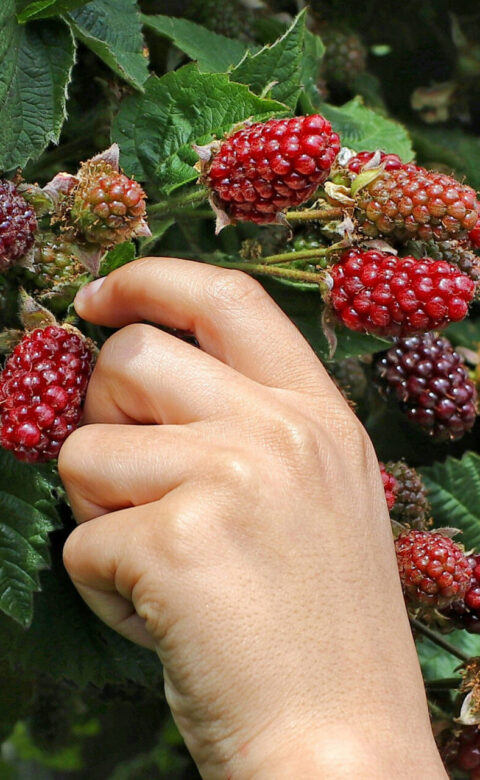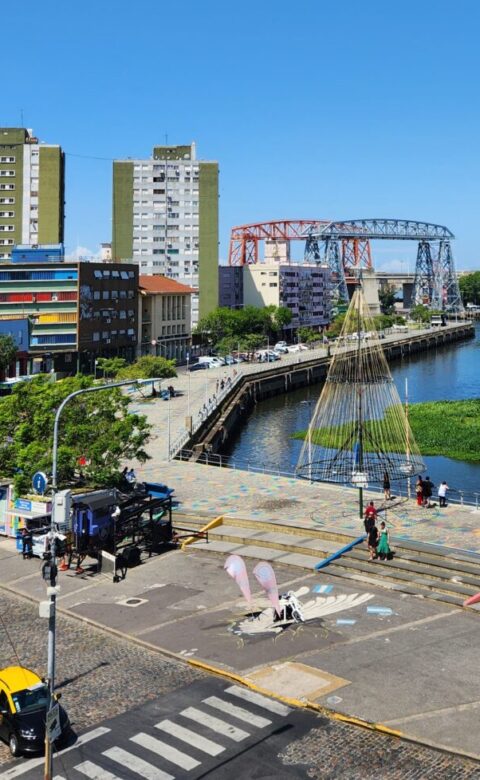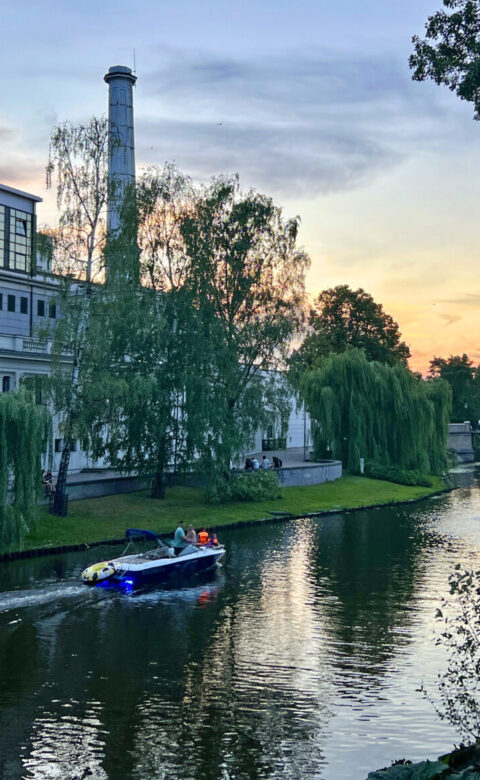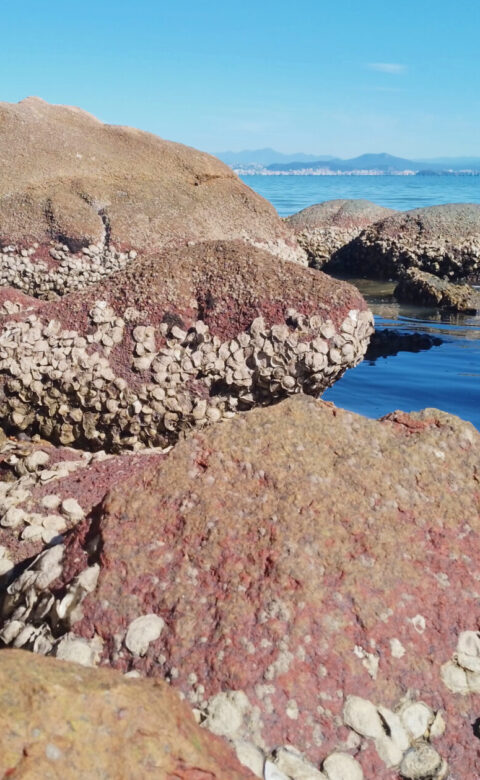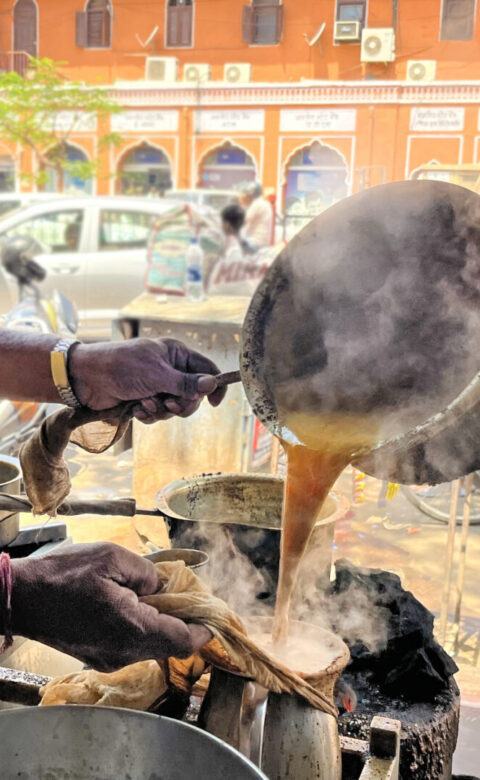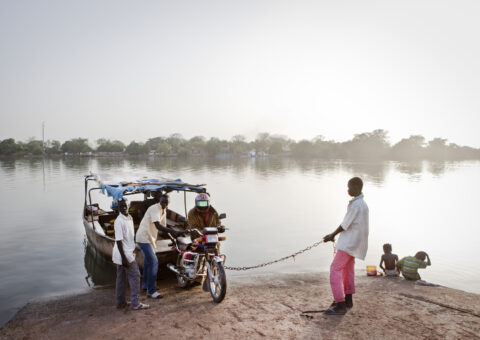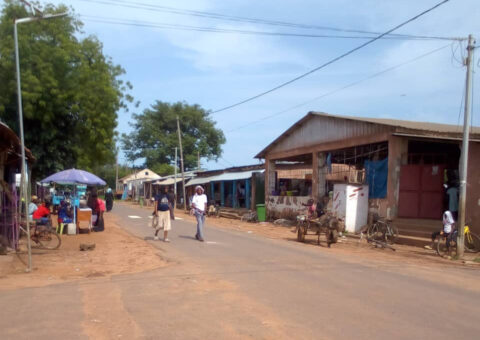I’ve always loved a market. Whether it’s Camden or Kolkata, there’s something irresistible about the sights, sounds and smells that emanate from their tangle of crowded alleyways. So when my wife, Fatou asked me to accompany her on a trip to the local weekly lumo to buy a ram, I jumped at the chance.
Lumos, as they are known all across the Central and Upper River Regions of The Gambia and parts of Senegal, bring people from all of the surrounding villages to buy and sell local products. They also attract traders from Senegal, Guinea and Mali selling all manner of items from magical potions to mobile phones. The closest lumo to where we live in Lamin Koto is at Wassu, home of the famous stone circles.
Lumos start early, and with the Islamic festival of Eid-Al-Adha (Tobaski) fast approaching the market was even busier than usual. It’s a time when Muslims spend on new clothes, good food and, most importantly, a sacrificial ram. By the time we arrived at 9 am the place was already packed.
Wassu is usually a quiet town with single-storey concrete buildings lining the highway, and the North Bank Road disappearing into the bush in either direction. This morning, improvised stalls lined the street in front of the shops, with some of them so close to the road that the throng of customers left room for just a single lane of traffic. Beeping trucks, cars, and motorbikes compete for the space with bicycles and horse or donkey carts, while people and animals fill the gaps in between.
Fatou sets off at pace, weaving through the chaos and I follow, trying to window-shop as we move. We pass a stall selling a massive selection of the latest mobile phones from India and China, with enough leads and cables to stretch between the two. Next to that, a woman in a glittering black and silver headscarf sits on a plastic bucket with four small piles of tomatoes laid out on a cloth in front of her. Next to her, two big men in overalls are brewing green tea as they sit on a tarpaulin covered in hand-made tools that could have come from the Iron Age. Axes, picks, hoes and other tools made from beaten metal fixed into heavy wooden handles. I nearly fall over a small girl selling frozen baobab drinks in plastic bags, so I buy one and decide to focus on keeping up with Fatou.
We turn off the highway and down a small side street with bedsheets strung across the road above us, shielding the glare of the sun and keeping the place cool. Colour is everywhere. From the beautifully dressed women, the stalls selling African cloth, the dazzling displays of soap and cosmetics to gleaming golden jewellery, every shade of every colour that exists in this world is to be found; sometimes all on one person.
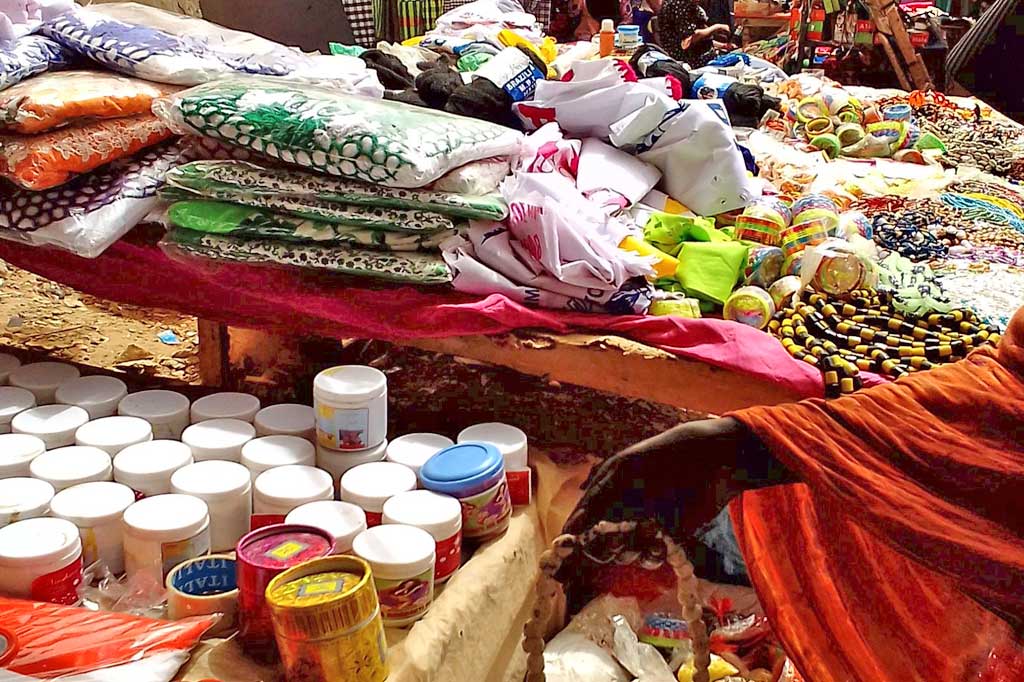
Fatou stops to look at some brightly coloured globules in small plastic bags. I recognise it as local incense known as Churrai. It’s a mix of seeds, fragrant woods and perfumes soaked together and pressed to form a resin. Aside from driving away mosquitos, people believe that it has spiritual and health benefits, and even aphrodisiac qualities. Each variety has its own particular aroma but in the highly scented alleyway, I couldn’t tell them apart. I bought a yellow one and we moved on.
Before we had gone far, a wholly different, pungent, musky smell assaulted our senses, and as we turned a corner we saw the reason. There were rams in all directions, along with a few cows and some goats — but mostly rams. There were trucks full of rams, rams on top of vehicles, people walking rams on ropes, people coaxing reluctant ones by their horns, rams on the back of bicycles and even one old man carrying one on his shoulders as you might do with a young child.
We walked towards the daral, the enclosed area that serves as a shop floor and watched for a few minutes. On a less busy day, the livestock stands or lies down in small groups as their owner tries to attract interest from customers. This day, the groups were so tightly packed together that they all merged into one huge flock. Most of the sellers are Wallenkos, the nomadic Fula people who move with their livestock and their families from place to place seeking pasture and water as the seasons change. They wear long robes and headscarves wrapped desert-style covering all but their eyes. They all carry sticks, but I notice that within the daral they are without their cutlasses, which are said to be so sharp that they use them to shave.
“Something like that one,” Fatou says, pointing at a stout, clean-looking ram. “It’s a Gambian variety. They’re shorter but they have more meat than the Senegalese breeds.”
I look at the gangly Senegalese specimens. They do indeed look to be all skin and bones and have an unusual shape, like miniature camels.
“What about one of those?” I ask as I look at a tall, muscular, handsome ram with impressive spiral horns.
“Crossbreed,” Fatou tells me. “The best of both varieties but forget it. Even here they go for D20,000 upwards. D30,000 in the city. People spend like crazy at Tobaski and half of them won’t be able to afford breakfast the next day.”
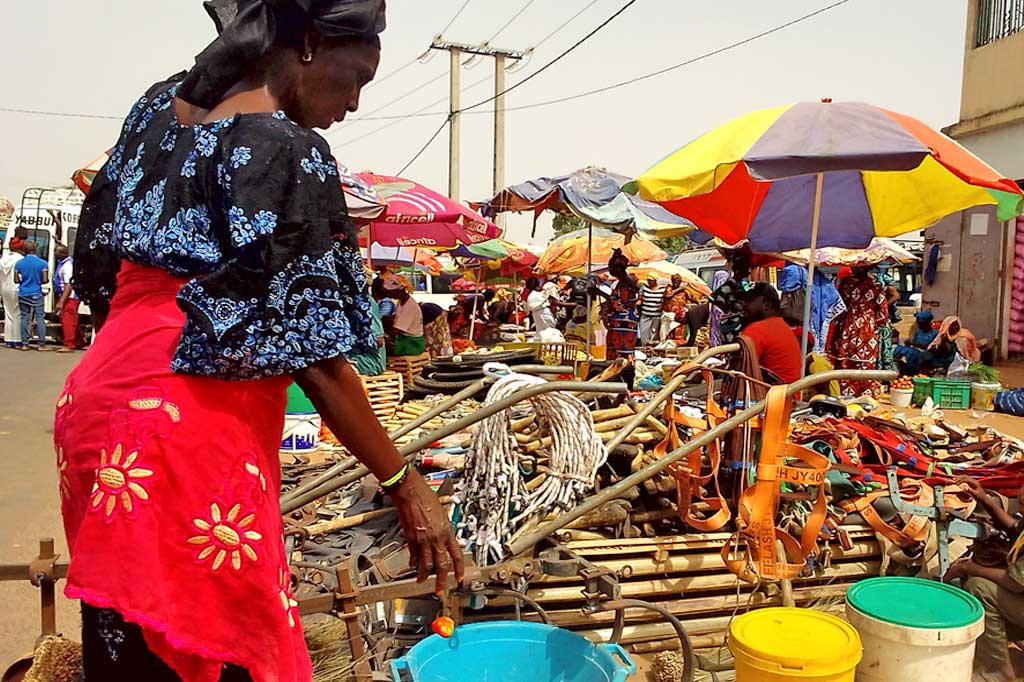
We enter the daral with Fatou leading the way, pushing past rams and people alike. We stop as she feels the flanks of a small Gambian variety and asks the price.
“CFA or Dalasi?” the owner asks.
“Are we in Gambia?” she retorts sharply. “I’m a Gambian. I think we’re in Gambia?”
She turns to me and adds, “These people are killing us with CFA!”
It’s a common complaint from Gambians. Despite historically having been more or less the same people as the Senegalese, colonisation and recent political manoeuvrings have created divisions and economic rivalries between the two when it comes to currency.
“9000 Dalasi,” he tells us. We thank him and walk away.
We stop next to a thin man in a Manchester United shirt, holding two rams on a rope. He’s a Gambian from a village just a few kilometres away, and works as a mechanic but supplements his income by keeping sheep and growing cassava in his compound.
His starting price is 7000 Dalasi for each, so Fatou grips one of them by the horns and turns it to face us, checking for any scars or injuries that would disqualify it from Tobaski duties. She nods approvingly and after a short discussion agrees with the man on 6000 Dalasi. I take the rope and lead Rambo, as I had by now named him, through the crowds and back towards the minibus stand.
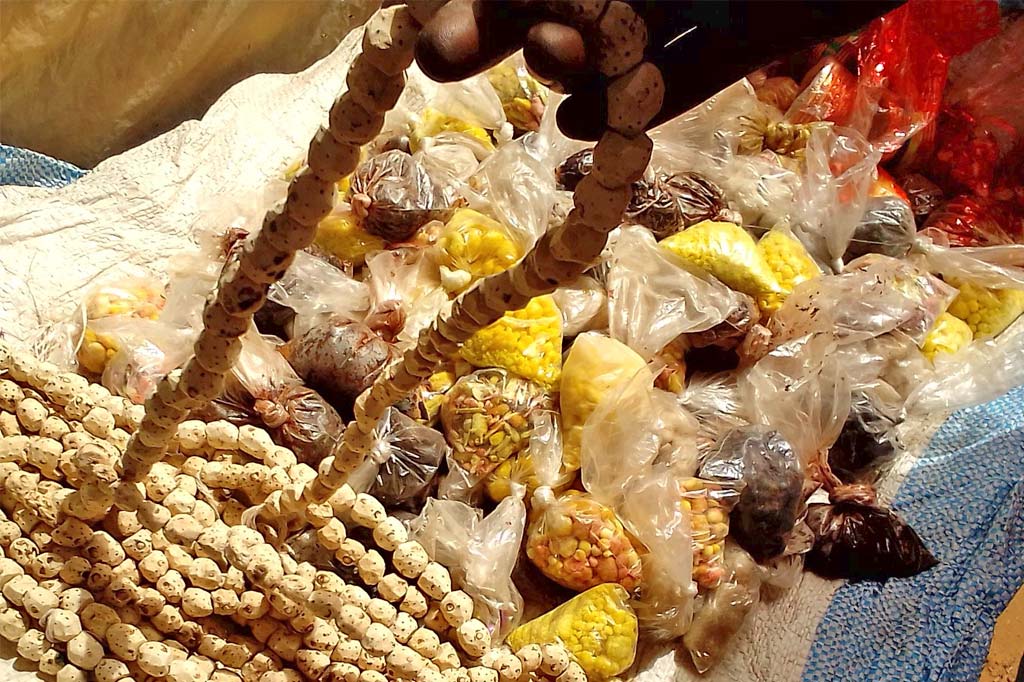
It started well. Rambo trotted happily along behind me, as if pleased to be away from the noise and dust of the crowded daral. It was only when I stopped to wait as Fatou disappeared around the corner in search of something to cook that my problems began.
Barely had Fatou left when I met an old friend from Janjanbureh. As we greeted, I failed to notice that Rambo had grabbed the chance to find his own lunch. By the time I heard the complaints of the nearby trader, Rambo was nose deep in a bucket of tomatoes and licking his lips. I pulled sharply on the rope and he slid a short distance towards me. I pulled again, but he’d planted all four feet on the floor and refused to budge. I slapped him across the rump and pulled again. Nothing.
Still optimistic despite the increasingly amused looks from all around, I went behind him and with a combined lift and push motion, tried to move him forward. Still nothing. His front feet stayed exactly where they were and he seemed ready to do a forward roll before he’d walk one inch.
By now, red-faced and sweating, I was losing patience. I gripped his front legs together and tried to pull him on his hind ones as I’d seen the Wallenkos do. At first, it seemed to work. Rambo looked at me surprised as we shuffled a few steps forward before he stretched his legs out behind him, ending up flat on his belly.
Before the scene could deteriorate further, Fatou reappeared wearing a bag of vegetables on her head. Whether it was the vegetables or her commanding presence I’ll never know, but she grabbed Rambo by one gnarly horn and he allowed himself to be escorted to the highway and soon after onto a vehicle. An hour later, Rambo was happily installed at my compound, chewing at my lemongrass while I tried to clean the dirt and sheep hair off my jeans.
Epilogue
I grew quite attached to Rambo over the few weeks leading up to Tobaski and when the day came, I made an excuse to go out while he met his maker. I consoled myself with the fact that he’d lived a happy, healthy life of roaming in the bush as nature intended, far from the cruelty of the industrial farming system that supplies meat to Europe. Well… that and the fact that he was delicious on a plate of spicy Jollof rice. Sorry, Rambo.

